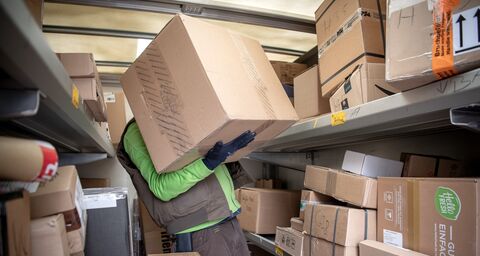
First apartment: the checklist
Bye bye Hotel of Mom and Dad – and into your own four walls: freedom calls! Moving out of your parents' house or apartment is an important step in life, but this event also involves costs and obligations. Our checklist will hopefully help make the move into the first home of your own a smooth one.
Finally your own home!
Many young adults can hardly imagine moving away from their parents' house or apartment and standing on their own two feet. Of course it was cozy at home: doing washing, cooking meals, cleaning, shopping, waste disposal - your parents did all or some of this and much more. Also, anyone living with their parents normally has nothing to do with insurance and other paper mountains involved with a property. Even if they're already over 18. They probably have no idea what living alone is really like if they've always lived at home with their parents.
However, it's healthy and understandable that young people want their own place sooner or later. The first apartment - small but beautiful, as it's your own space! Or a massive old house for setting up a shared home with friends, work colleagues or fellow students. Perhaps you’d finally like to move in with your partner. Either way, the tips on our checklist ensure that you don't have any nasty surprises when you move into your first apartment.
1. Moving out: estimate how much it will cost
Before you sign a tenancy agreement, it’s a good idea to draw up a detailed budget. Many young people don’t realize how much their parents have paid for them over the years. If all the costs were added together, it would come to a shockingly high amount. So you should be realistic and take a critical look at whether you are also ready financially to stand on your own two feet. Consider creating your own personal budget (in German) comprising the following points:
- Accommodation costs: rental guarantee, rent, ancillary costs (heating, water, waste disposal, maintenance etc.)
- Services: electricity, internet and TV, telephone and cell phone contract, radio and TV charges (Serafe), garbage bags and stickers
- Health and insurance: doctor and dentist, eye specialist and optician, health insurance and supplementary insurance, liability and house contents insurance, possibly legal insurance, travel insurance
- Mobility: local public transport, maintenance of bike or e-bike; if car/motorcycle owned: cost of renting parking space, car insurance/motorcycle insurance (liability and accidental damage), motor vehicle tax, service and maintenance, fuel and cleaning materials, parking charges and highway toll tag etc.
- Personal and leisure time: clothes and shoes, hair and grooming products, gym membership and sports club, hobbies and membership fees, education and training, going out and events, vacations and trips, gifts and unexpected expenditure, tax
- Moving home: renting a car, packaging and small material, disposal, redirection order, food and thank-you for those who helped you move etc.
- Setting up: furniture, bedding and towels, household and entertainment electronics, cooking and eating utensils, lamps and lights, carpets and curtains, cleaning tools and materials, consumables and food, decoration and house plants etc.
Last but not least, you should always keep an adequate amount of spare cash in reserve so that you’ll stay liquid whenever an unexpectedly high bill comes your way. In the worst-case scenario, it will save you a great deal of stress.
2. Administrative aspects: make sure you stay connected
The die has been cast: your new address is now definite. You should contact your preferred provider a couple of weeks before your move to ensure that the internet is connected on time. Also remember to register with Serafe , as you have to pay radio and TV fees once you've started your own household. If you're living in a shared property, expenses like these can be shared. Other agencies that need your new address are, for example, your health insurance fund, residents' registration office, driver and vehicle licensing office, employer, banks and cellphone provider.
Our tip: you can set up an inexpensive redirection order so that your mail doesn't continue to arrive at your parents' home.
3. Rental guarantee: a lot of money that lies dormant
The rental guarantee is a fixed part of the tenancy agreement. It offers the landlord security in case you can no longer pay the rent or the apartment is damaged when you move out. Normally you have to pay two to four months' rent into an escrow account to cover this. And the money is tied until you move out. If you don't have this amount of money available, there is an alternative: rental guarantee insurance. It takes over if the landlord has justified claims for damage or rental arrears.
4. List of defects: be picky
The previous tenant has finally moved out and the day of your move has arrived. The landlord or management company now has to officially hand the apartment over to you. Stay alert during this meeting: check all the rooms carefully and make sure all visible defects are noted properly on the handover report. Otherwise, when you move out, you may be forced to pay for damage that you didn't cause yourself. For example, is there a crack in the washbasin or are there water stains that haven't been listed in the report? There's often a great deal of uncertainty when it's your first apartment in particular. Prepare well by means of a suitable checklist, usually called a handover report or defects list. Perhaps you can take someone with you who already has experience of handovers.
The meter readings for electricity, gas and water should also be included in the report. If you discover any additional defects after moving in, you can report these to the landlord in a registered letter within ten days of receiving the keys and they will be added to the report for the tenancy agreement. MyRight gives you more helpful tips on the subject of apartment handover.
5. Insurance: the greatest risks
The topic of insurance becomes relevant for you when you move away from home. If you have to deal with this for the first time, you should first create an overview: what types of insurance make sense for young people who are just starting out in their career or still studying? The most important thing to begin with:
Protect yourself against claims for damages
There's one insurance that you need when you leave home and that's personal liability: it pays benefits if you accidentally cause damage to others if, for example, you cause damage to a friend's car while parking, or if you're on your bike and collide with a pedestrian who subsequently invoices you for expensive medical treatment. In extreme cases, such claims can run into millions.
Personal liability insurance also makes sense for tenants, as it covers damage you cause to the rental apartment or house. Examples: a frying pan slips out of your hand and damages the ceramic stove. Or a sunshade gets damaged at a party. Then at the end when you move out and do the final inspection with your landlord, you'll be glad you're properly insured. The insurance also helps you defend yourself against unjustified claims.
Insure your belongings
New furniture, a big TV, a nice sofa – after your move, your apartment gradually fills up, and the value of your personal possessions increases. It's worth taking out insurance for your household contents as soon as you've moved in. This pays benefits if, for example, entertainment electronics are stolen in a break-in, if the apartment burns down, or if the basement is flooded.







